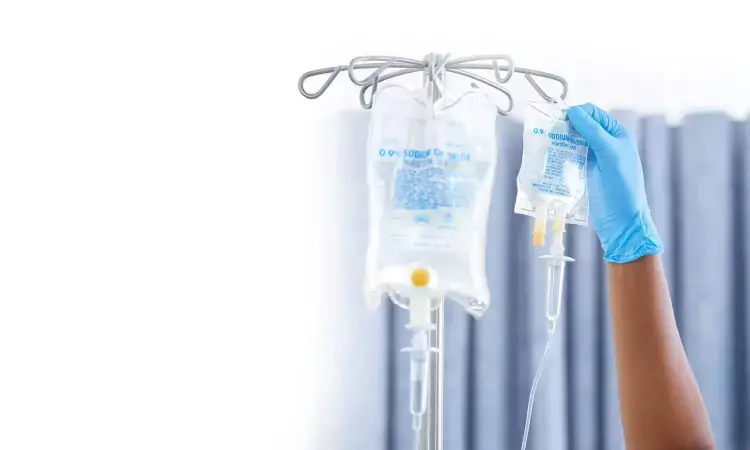- Home
- Medical news & Guidelines
- Anesthesiology
- Cardiology and CTVS
- Critical Care
- Dentistry
- Dermatology
- Diabetes and Endocrinology
- ENT
- Gastroenterology
- Medicine
- Nephrology
- Neurology
- Obstretics-Gynaecology
- Oncology
- Ophthalmology
- Orthopaedics
- Pediatrics-Neonatology
- Psychiatry
- Pulmonology
- Radiology
- Surgery
- Urology
- Laboratory Medicine
- Diet
- Nursing
- Paramedical
- Physiotherapy
- Health news
- Fact Check
- Bone Health Fact Check
- Brain Health Fact Check
- Cancer Related Fact Check
- Child Care Fact Check
- Dental and oral health fact check
- Diabetes and metabolic health fact check
- Diet and Nutrition Fact Check
- Eye and ENT Care Fact Check
- Fitness fact check
- Gut health fact check
- Heart health fact check
- Kidney health fact check
- Medical education fact check
- Men's health fact check
- Respiratory fact check
- Skin and hair care fact check
- Vaccine and Immunization fact check
- Women's health fact check
- AYUSH
- State News
- Andaman and Nicobar Islands
- Andhra Pradesh
- Arunachal Pradesh
- Assam
- Bihar
- Chandigarh
- Chattisgarh
- Dadra and Nagar Haveli
- Daman and Diu
- Delhi
- Goa
- Gujarat
- Haryana
- Himachal Pradesh
- Jammu & Kashmir
- Jharkhand
- Karnataka
- Kerala
- Ladakh
- Lakshadweep
- Madhya Pradesh
- Maharashtra
- Manipur
- Meghalaya
- Mizoram
- Nagaland
- Odisha
- Puducherry
- Punjab
- Rajasthan
- Sikkim
- Tamil Nadu
- Telangana
- Tripura
- Uttar Pradesh
- Uttrakhand
- West Bengal
- Medical Education
- Industry
Study Finds No Benefit of Parenteral Calcium for ICU Patients with Hypocalcemia, Raises Concerns Over Potential Harm

Netherlands: A recent study on critically ill ICU patients with hypocalcemia found that parenteral calcium administration provided no survival or shock resolution benefits and may even pose potential harm.
"Intravenous calcium administration showed no significant impact on 180-day mortality (aHR: 1.18) or time to shock resolution (aOR: 0.81). Moreover, in patients with sepsis and mild hypocalcemia, calcium treatment was associated with increased 90-day (aHR: 1.88) and 180-day (aHR: 1.79) mortality risks," the researchers reported in the Journal of Intensive Medicine.
Hypocalcemia is a frequent condition among ICU patients. Still, the use of calcium therapy in critically ill individuals remains controversial due to conflicting outcome data and a lack of detailed subgroup analyses. To address this gap, Max Melchers, Department of Intensive Care Medicine, Gelderse Vallei Hospital, The Netherlands, and colleagues aimed to explore the relationship between parenteral calcium administration and clinical outcomes in critically ill patients with hypocalcemia, both with and without sepsis.
For this purpose, the researchers conducted a retrospective cohort study involving patients who developed hypocalcemia within the first seven days of admission to a mixed medical-surgical adult ICU at a university-affiliated teaching hospital. The study included patients admitted for at least 48 hours between October 1, 2015, and September 1, 2020, who were not receiving renal replacement therapy.
Primary outcomes assessed were all-cause 180-day mortality and time to shock resolution. Subgroup analyses were performed for patients with sepsis and non-sepsis, categorized by mild or moderate hypocalcemia based on median splits. Proportional hazard regression analyses were utilized to examine the relationship between parenteral calcium administration and clinical outcomes.
The following were the key findings of the study:
Study Population:
• Out of 1100 included patients:
• 427 (38.8%) were admitted for sepsis.
• 576 (52.4%) received parenteral calcium.
Primary Findings:
- Overall 180-Day Mortality:• here were no significant difference between patients who received and did not receive parenteral calcium (aHR: 1.18).
- Time to Shock Resolution:• Intravenous calcium reduced the probability of a shorter time to shock resolution (adjusted odds ratio: 0.81).
Subgroup Analyses:
- Sepsis vs. Non-Sepsis Patients:• There were no significant association between calcium administration and 180-day mortality in patients with sepsis (aHR: 1.63) or without sepsis (aHR: 1.06).
- Sepsis and Mild Hypocalcemia:• Parenteral calcium was associated with increased risks of:• 90-day mortality (aHR: 1.88).• 180-day mortality (aHR: 1.79).
The study showed that hypocalcemia and subsequent parenteral calcium administration (PCA) were prevalent in this large cohort of critically ill patients. However, PCA did not improve clinical outcomes; instead, it was linked to delayed shock resolution and reduced long-term survival in patients with sepsis.
"These findings highlight the importance of exercising caution when administering calcium routinely to critically ill patients with hypocalcemia. A randomized controlled trial (RCT) is needed to validate these results, investigate the underlying mechanisms, and develop evidence-based treatment guidelines," the researchers concluded.
Reference:
Melchers, M., Moonen, H. P. F. X., Breeman, T. M., Van Bree, S. H. W., & Van Zanten, A. R. H. (2024). Parenteral calcium administration and outcomes in critically ill patients with hypocalcemia: A retrospective cohort study. Journal of Intensive Medicine. https://doi.org/10.1016/j.jointm.2024.08.003
Dr Kamal Kant Kohli-MBBS, DTCD- a chest specialist with more than 30 years of practice and a flair for writing clinical articles, Dr Kamal Kant Kohli joined Medical Dialogues as a Chief Editor of Medical News. Besides writing articles, as an editor, he proofreads and verifies all the medical content published on Medical Dialogues including those coming from journals, studies,medical conferences,guidelines etc. Email: drkohli@medicaldialogues.in. Contact no. 011-43720751


